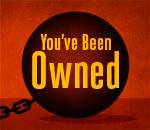One year ago today
Heinlein on Kirtsaeng: "There has grown up in the minds of certain groups in this country the notion that because a man or corporation has made a profit out of the public for a number of years, the government and the courts are charged with the duty of guaranteeing such profit in the future, even in the face of changing circumstances and contrary to public interest. — Read the rest
This really deserves its own post. In the comments on the post on Kirtsaeng — where the Supreme Court just upheld the right to sell used goods, even if they were made abroad — Shrikant quotes from Heinlein's classic short story Life-Line:
"There has grown up in the minds of certain groups in this country the notion that because a man or corporation has made a profit out of the public for a number of years, the government and the courts are charged with the duty of guaranteeing such profit in the future, even in the face of changing circumstances and contrary to public interest.
— Read the rest
Yesterday, I wrote about the Supreme Court's hearting for Kirtsaeng v. Wiley, which threatens to undermine the very nature of property itself, taking away your right to sell, modify, loan and give away any foreign-made object that has embodies one or more copyrights. — Read the rest

In 2013, the Supreme Court heard Kirtsaeng, a copyright case brought by the publisher Wiley, who argued that legal books became illegal when brought into America, because their copyright licenses were nation-specific.
The US Supreme Court has handed down a verdict in Kirtsaeng v. John Wiley & Sons, one of the most important copyright cases of the century. In it, the publisher John Wiley & Sons sought to block the import of legally purchased cheap overseas editions of its books by arguing that "first sale" (the right to resell copyrighted works) only applies to goods made in the USA. — Read the rest

On the EFF's Deep Links blog, Parker Higgins presents the stakes in today's Supreme Court hearing for Kirtsaeng v. Wiley, which concerns the right of a student, Supap Kirtsaeng, to import textbooks from overseas and sell them in the USA. — Read the rest
Writing in MarketWatch, Jennifer Waters explains the implications of a Supreme Court case, Kirtsaeng v. John Wiley & Sons, which turns on the question of whether you have the right to re-sell things you buy out of the country, or whether the copyrights embodied by your phones, clothes, gadgets, books, music, DVDs, and other possessions mean that you can't sell your stuff without permission from the original manufacturer. — Read the rest

